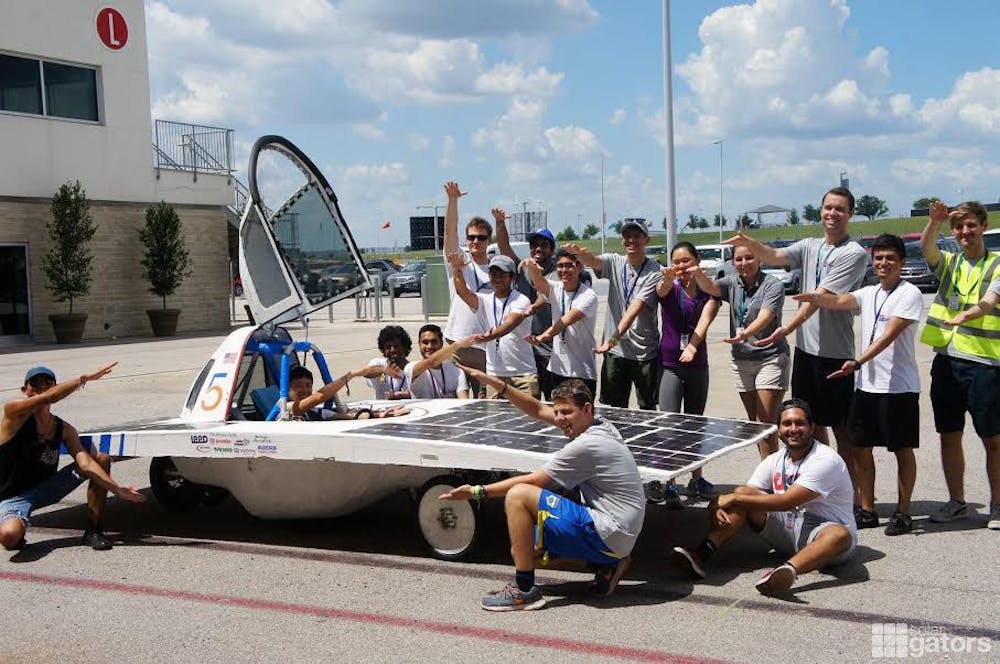Last Summer, four UF students logged onto Google Hangouts to discuss a seemingly ambitious, even far fetched goal: to create a solar-powered car and race it in Austin, Texas.
Earlier this month, the Solar Gators achieved that goal, making the presence of UF’s solar racing team known on the racetrack of the annual Formula Sun Grand Prix.
The Solar Gators, which disbanded briefly between Spring 2014 and Summer 2016, is currently comprised of about 25 students who aim to raise awareness about sustainability through the construction of solar-powered vehicles.
Ananda Sundararaman, a UF mechanical engineering fourth year and the president of Solar Gators, said the team worked on its solar-powered car for most of Summer A. Although they didn’t place in the competition, he said making it to Texas — where 20 other teams were competing — was special.
Once there, the competition proved to be just as difficult.
Due to the team’s initial difficulties in Texas, which included troubleshooting issues and battery fires, Sundararaman, 21, said getting the vehicle ready to race on the competition track was a huge accomplishment in and of itself.
In order to make it onto the competition track, known as the Circuit of the Americas, competitors are required to make it past the three-day inspection phase, which can be very difficult, Sundararaman said.
“It was an against all odds kind of thing,” he said. “There were teams that were there that had been there before that weren’t able to pass inspections.”
Because the team faced so many obstacles at the beginning of the six-day competition — which took place between July 3 and July 8 — Sundararaman said the Solar Gators became known to other competitors as the underdogs.
Sundararaman said other competitors even helped out by giving the Solar Gators advice as well as mechanical parts for their solar-powered vehicle.
On the last day of the event, when the Solar Gators car pulled up to the starting line just minutes before the 5 p.m. end time, everyone was chomping and cheering, Sundararaman said.
“It wasn’t just our team. All the teams were going crazy Gator Chomping, supporting us and cheering for us because a couple hours before it hadn’t seemed like we were going to be able to compete,” he said.
The Solar Gators receive a bulk of their financial support from the Department of Mechanical and Aerospace Engineering, which encourages students to participate in design-and-build competitions, said department chair David Hahn.
Hahn said between all the vehicle’s parts and travel costs, the Solar Gators’ past year cost about $20,000, which is significantly less than universities with older, more experienced teams.
Now that the Solar Gators have attained their main goal — successfully making it to the Formula Sun Grand Prix — Hahn said he believes the team will continue to grow.
“I think this gave them the confidence that they can get a car out there on the track to complete the course,” Hahn said. “I feel passionately that these design-and-build projects are really important for the students.”
Now that his team has proven they can build a raceable, solar-powered car, Sundararaman said he hopes that Solar Gators will be able to build a competitive car.
“Our goal is (to) produce a car that is more competitive that elevates our standing within the solar car community of different universities,” Sundararaman said. “In that process, we hope to continue to recruit both young and experienced members to both help make that goal a reality and kind of foster the community of development that we have.”
The Solar Gators’ car got onto the competition track just three minutes before the cutoff for the final race. Solar Gators president Ananda Sundararaman said when they were able to scale the first hill on the track, all the universities that helped the team burst into cheers.






